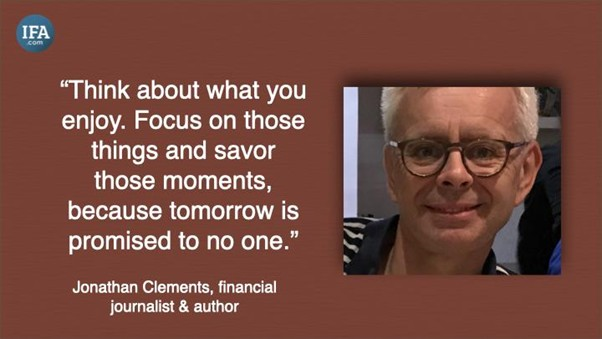The legendary Wall Street Journal columnist Jonathan Clements has died of cancer at the age of 62. He spent his final months embodying everything he'd long preached about money: that its true value isn't in accumulation, but in the peace of mind that comes from getting the basics right. His journey from covering star fund managers to championing index funds mirrors the evolution that every thoughtful investor should consider making.
For Jonathan Clements, investing was never the end itself. It was a means — a way to worry less, live more, and enjoy life today as well as in retirement. And he didn't just write that message. He lived it.
"What brings me joy now is the simple things," he told me in a podcast interview last December. Coffee in the morning, sunlight through the window, the satisfaction of work he still loved. "These small pleasures, not extravagance, are what really matter."
From Star Managers to Indexing
Born and educated in England, Clements arrived in New York in 1986 to cover mutual funds for Forbes. It was the celebrity manager era, when figures like Peter Lynch commanded magazine covers and billions in assets.
"Most of my early writing was about star managers," he recalled. The media thrived on fresh heroes; fund firms thrived on selling yesterday's winners; investors bought high and sold low. Everyone profited except the people whose money was at risk.
The turning point came when he met Jack Bogle, the evangelist for low-cost indexing. Bogle, Clements told me, "had a huge influence" on him. By 1994, when he launched his WSJ column, he was focusing relentlessly on indexing. Data was clear: index funds, on averrage, outperformed active managers over the long term.

Quotes and images included are for illustrative purposes only and should not be considered as endorsements, recommendations, or guarantees of any particular financial product, service, or advisor.
Investing Is Mainly About Behavior
Central to Jonathan Clements' investment philosophy was the importance of investor behavior. "The goal isn't to beat the market," he argued, "but to harness it for your financial goals."
Clements understood that even intelligent, wealthy people often know what they should do, but struggle with execution. "Patience is constantly tested," he observed. The media and Wall Street thrive on churn, but investors profit by staying the course. His mantra was simple: "The less you fiddle, the more you gain."
He saw sophistication not in exotic strategies but in simplicity. "The financial industry thrives by creating complexity," he warned. "But complexity is often the enemy of good investment results." Maturity meant abandoning ego-driven attempts to outsmart markets in favor of harnessing their long-term growth.
A Life of Integrity
Jason Zweig, his colleague and friend, spoke movingly of Clements in a recent interview with Morningstar. "Jonathan wrote 1,009 columns," said Zweig. "He never misled or fibbed, or lied to his readers. He constantly filtered out the nonsense and the noise in Wall Street propaganda. He's a role model for any financial journalist."
As Ron Lieber wrote in the New York Times, Clements never traded in easy slogans or fashionable advice. He urged young people not to rush into "following their passion," but instead to build financial security first. Do that early, he argued, and you'll have the freedom later to focus on meaning and fulfilment in your work.
Final Wisdom
When terminal illness strips away pretence, it reveals what we truly believe about money. "People ask if I'll go on a spending spree," he told me in our interview last December. "But the truth is I want my family to be secure."
His final reflections transcend finance. "A terminal diagnosis sharpens your sense of what matters. What brings me joy now is the simple things: coffee in the morning, a walk in the sun, conversations with friends, the work I love."
Jonathan Clements' life and writing leave us with a message both humbling and liberating: money's highest purpose is to free us. Free from worry, so we can focus on what matters. Free from complexity, so we can embrace simplicity. Free from the chase for more, so we can savor enough.
Whether you have decades ahead or only months, his advice remains the same: get the basics right, then focus on what truly matters.

Quotes and images included are for illustrative purposes only and should not be considered as endorsements, recommendations, or guarantees of any particular financial product, service, or advisor.
ROBIN POWELL is the Creative Director at Index Fund Advisors (IFA). He is also a financial journalist and the Editor of The Evidence-Based Investor. This article reflects IFA's investment philosophy and is intended for informational purposes only.
IFA does not endorse or guarantee the accuracy of third-party content. For those seeking additional insights into the challenges of market timing, Step 4 of Mark Hebner's award-winning book ‘Index Funds: The 12-Step Recovery Program for Active Investors' offers a detailed perspective. References to third-party resources, including books, are informational and do not constitute endorsements or solicitations. IFA does not receive compensation related to this recommendation.
This article is for informational purposes only and does not constitute personalized investment advice. All investments carry risks, including the potential loss of principal. We recommend consulting a fiduciary or qualified financial advisor before making any investment decisions to ensure alignment with personal financial goals, risk tolerance, and circumstances. Past performance does not guarantee future results.
For additional information about IFA, including detailed information about services, compensation, and potential conflicts of interest, please review our brochure available both at www.adviserinfo.sec.gov and www.ifa.com.
For additional information about Index Fund Advisors, Inc., please review our brochure at https://www.adviserinfo.sec.gov/ or visit our website at www.ifa.com.














